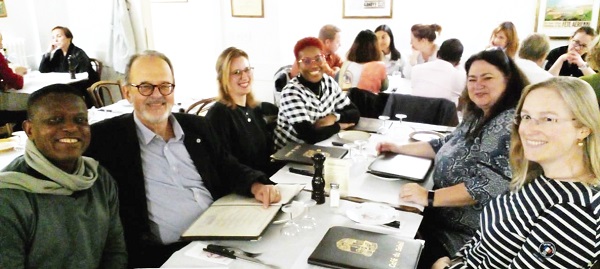
A passage to Geneva
It’s sunset in Switzerland and I was on a boat on the enchanting Lake Geneva. All around me were other boats filled with tourists who were taking advantage of the nice weather to enjoy a ride on the famous lake.
A few metres away spurting into the twilight was a vertical jet of water known as the Jet d'eau de Genève. From the radio of the 20-seater boat where I sat with other tourists, a recorded information about the lake and its other tourist attractions such as the golf courses and a waterpark were relayed to us.
In addition to the boat ride, tourists could also go swimming, fishing, canoeing, and kayaking in the lake, or take a scenic hike or bike ride along one of the many trails in the area. In short, there was something for everyone on Lake Geneva.
Lake Geneva
Lake Geneva, also known as Lac Léman (French) or Lake Leman (German), the largest lake in central Europe, is about 583 sq km in area, straddling the border between Switzerland and France.
However, the largest part of the lake, about 363 sq km, is in western Switzerland. In addition, the vertical water jet, which has been a true emblem of Geneva since 1891, is 140-metre in height. Created in the 19th century, the water comes from a release valve designed to relieve over pressure from a hydraulic pumping station.
We were also informed that the jet d’eau didn’t run constantly as it was switched off at night, in strong winds and during below zero temperatures.
The city
Geneva, a city in Switzerland regarded as one of Europe’s most cosmopolitan cities, has a population of about 200,000.
Surrounded by the Jura Mountains and the Alps, the city offers exceptional views of the majestic Mont-Blanc. Headquarters of the United Nations Office and the Red Cross, it is a world centre for diplomacy and the banking sector.
The French influence is widespread in both the language and cuisine, even though German and Italian languages are also spoken.
I had come to Geneva alongside Paulina Holmgren, a Swedish writer and photographer, to represent the London-based International Authors Forum (IAF) at a two-day meeting which took place at the headquarters of the World Intellectual Property Organisation (WIPO).
The purpose of the meeting was to gather suggestions from key stakeholder organisations in the book industry, including intellectual property experts, policy makers and cultural heritage professionals, on how to address the legal, financial and ethical obligations in the preservation of cultural heritage collections within the scope of copyright legislation.
Having spent the previous 48 hours pouring over the voluminous and highly technical 38-page ‘Preservation Tool Kit’ document, I arrived in Geneva from my Accra, Ghana base, well prepared and in high spirits for the meeting.
The taxi driver, who took me from the airport to my hotel in downtown Geneva, was a chatty young man from Turkey. Within the period of the short trip to the hotel, he had briefed me extensively about Geneva.
According to him; “Geneva is a beautiful place and a global city. It is also a financial centre, and a worldwide centre for diplomacy due to the presence of numerous international organisations, including the headquarters of many agencies of the United Nations and the Red Cross. The city hosts the highest number of international organisations in the world with 25 per cent of its population being foreign individuals”.
Downside
However, the downside to the city, according to the driver, was the high cost of living and police excesses. “If you park your car wrong, it's a police matter. If you missed to pay the ticket for the tram, it's a police matter.
“Some of my friends who live in apartments complain that if you pee after 10 pm, it's better not to flush until the morning. If you do it right away, the neighbours may call the police and you'll be fined for making noise at late hours,” he added.
Hoping to catch some rest before my first informal meeting during dinner, I quickly checked into my hotel which I felt was too pricey at $350 a night.
I was, however, pacified when I discovered that the hotel rate also went with a Swiss rail pass, which would give me access to travel by train, coach, boat, streetcar, city bus, a public taxi and cable car.
Fortunately, the tram to the Nations Terminus (The UN Headquarters) next to the WIPO headquarters, venue of my main meetings, was just four stops from the hotel.
To confirm the international nature of the work force in Geneva, the taxi driver who took me for my dinner meeting at the other end of the city was a Moroccan. He also confirmed that the city was very safe and well organised.
However, unlike his Turkish colleague, he did not complain of any police harassment. Apart from being expensive, his own complaint was what he called the ‘cold’ nature of the citizens of the city.
According to him; “It’s hard to make friends here. People are only friendly if you are just a tourist who leaves money and then leaves the country”.
